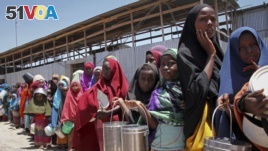30 July, 2017
Drought and conflict have caused a new displacement crisis in the southern part of Somalia.
Gerard Waite is chief of mission for the International Organization for Migration Somalia. He said about 800,000 people fled their homes over the past seven months. This is in addition to the 1.1 million people already displaced in the country.
"We have a displacement crisis on top of a drought crisis," Waite said.

FILE - Displaced Somali girls who fled the drought in southern Somalia stand in a queue to receive food handouts at a feeding center in a camp in Mogadishu, Somalia.
Poor camp conditions
He also said that the newly displaced people have put heavy pressure on existing camps.
"These camps are, by and large, not very well managed. They are normally on private land in very cramped conditions. They do not have the basic services in these camps," Waite said.
The displaced people are not living in healthy conditions, and are forced to drink unclean water. This has caused over 71,000 cases of cholera or severe diarrhea in 2017, resulting in nearly 1,100 deaths.
"Water shortages have meant that people are drinking higher-risk water, taking water which they know to be contaminated but they drink it anyway," Waite said.
Difficult weather patterns
Climate experts say the recent rainy season was well below average this year. It usually lasts from April to June. The next rainy season is not expected until October, but experts warn there will be heavy crop losses.
In addition, climate estimates suggest that there is a 45 percent chance of an El Niño weather event late in 2017. That could cause a further reduction in rain.
An El Niño is an irregular weather event usually resulting in warmer-than-average temperatures in some places around the world.
Waite said about 6.7 million people in Somalia are either suffering or near suffering from a food crisis.
Managing and preparing for drought
According to Waite, the International Organization for Migration has learned from Somalia's drought in 2011. In that period of extremely dry weather, 200,000 people are believed to have died.
"The need to deliver health systems to these places is extremely pressing," Waite said. However, he said they are also trying to work with the Somali government to create spaces that are better controlled and managed.
Somalia's finance minister, Abdirahman Duale Beyle, told VOA in May that the droughts in Somalia are cyclical. He also said Somalia has become too dependent on external aid.
"We have to change that kind of attitude," Beyle said.
There are projects meant to prepare Somalia for droughts, however.
The IOM, for example, is introducing drought-resistant potatoes. The U.N. Development Program is helping with several projects, including creating below-surface water tanks, wells, and community water storage ponds in Somaliland.
Beyle said now is the time for Somalis themselves to take responsibility for solving the problem.
"We have the technology, the intelligence and the know-how to break the link between drought and famine," he said.
I'm Phil Dierking.
Salem Solomon reported this story for VOANews. Phil Dierking adapted her report for Learning English. Mario Ritter was the editor.
How do you think a country can prepare for drought? We want to hear from you. Write to us in the Comments Section or on 51VOA.COM.
________________________________________________________________
Words in This Story
drought - n. a long period of time during which there is very little or no rain
contaminated - adj. to be made dangerous, dirty, or impure by adding something harmful or undesirable to it
cramped - adj. not having enough space inside
cyclical - adj. happening again and again in the same order
displace - v. to force (people or animals) to leave the area where they live
manage - v. to take care of and make decisions about
external - adj. coming from outside
famine - n. a situation in which many people do not have enough food to eat